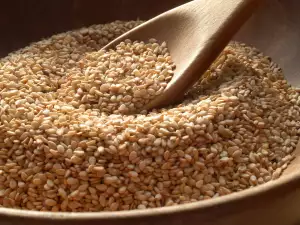Everyone has heard the maxim, that food can be both medicine and poison. And that's completely true. It is proved by one of the 600 known carotenoids - lutein.
It is one of the organic pigments (carotenoids) that are naturally present in plants and all organisms that undergo photosynthesis. Examples of such are algae, some fungi and bacteria.
Lutein is found in some green foods, but what does it do for the human body? That is the question, the answer to which will illuminate the benefits of lutein.
Nature of lutein and its presence in nature and man
The carotenoid lutein in nature has a closely related component - zeaxanthin. They are yellow to red pigments that are widely found in vegetables and other plants. Although lutein is considered a yellow pigment, when in high concentrations it is orange-red.
In nature, lutein and zeaxanthin absorb excess light energy to prevent damage to plants from too much sunlight, especially high-energy light rays scientifically called blue light.
Besides plants, these two carotenoids are also found in high concentrations in the macula of the human eye. It is precisely these that give the macula its yellowish color.
In science, the macula has the name macula lutea. In Latin macula means spot and lutea is yellow. So the yellow spot (macula) owes its color to the carotenoid lutein.
Research into the properties of lutein led to an interesting result. Scientists have identified a third carotenoid in the macula and named it mesozeaxanthin, but this component is not found in food sources and appears to be created in the retina as a result of ingested lutein.
But what is the role of lutein and its related components in eye health? Research on lutein has proven that it accumulates in the eyes in two places - in the macula and in the lens.
Among eye injuries, those in the lens take first place. 98 percent of the dry matter in the lens is protein. Free radicals damage protein, causing degeneration. The result is the disease colloquially called curtain of the eye.

It is very common in the elderly and the causes of its appearance are sunlight, ultraviolet radiation, as well as some diseases, such as diabetes for example. Protection is achieved with lutein, which reduces cases by 30 percent with regular use.
Eye health is an important component of overall health status, as it is greatly compromised with advancing age. Then the so-called age-related macular degeneration occurs. The condition for the appearance of this condition is on the face, when the fragile center of the retina - the macula - begins to collapse slowly but persistently under the pressure of age.
The macula is a small center in the retina of the eye that, when damaged, results in loss of central vision. The macular pigment lutein and zeaxanthin protect the macula from the harmful photo-oxidative effects of blue light.
This does not end the protective role of lutein for the eyes. It also aids vision in other ways:
- strengthens the eyes in other disorders such as myopia, farsightedness and astigmatism. Lutein strengthens the capillaries in the eye and prevents thrombus formation in the retina. Protects diabetics and smokers from their higher risks of eye problems;
- improves the adaptation of the eyes to light and darkness and is therefore invaluable when driving at night. Helps with the syndrome of tired eyes during all-day computer work, as well as work in artificial light;
- protects the eyes from damage from free radicals arising from cigarette smoke, polluted air, UV rays, systemic use of drugs and other harmful effects.
The role of lutein as an antioxidant in the body
Lutein and its related component zeaxanthin have important antioxidant functions in the body. Together with other natural antioxidants such as vitamin C, beta-carotene, vitamin E, these important pigments protect the body from the harmful effects of free radicals, which are unstable molecules can destroy cells and play a role in many diseases.
Therefore, lutein also protects against atherosclerosis and reduces the risk of certain types of cancer among smokers and ex-smokers. It has huge benefits for heart health.
Foods containing lutein
The best natural sources of lutein and zeaxanthin are green leafy vegetables and other yellow or green vegetables. The list of the most beneficial foods in this regard is topped by boiled spinach and boiled cabbage, according to the US Department of Agriculture and Food.
Non-vegetarian sources of lutein are egg yolks. With high cholesterol, however, they are not a suitable food and therefore the yellow pigment is good to obtain and from yellow fruits and vegetables.
Red peppers are a great lutein booster, which can be consumed in countless variations and recipes.
It can also be taken as a food supplement, as the color of the marigold contains the optimal amount needed for the production of the supplement.

Recommended daily intake of lutein
Because of the obvious benefits of lutein for the eyes and the cardiovascular system, as well as for the prevention of some of the most common diseases, many food companies have added this carotenoid to their vitamin formulas. Others have introduced special eye vitamins that consist primarily of lutein and zeaxanthin.
There is no recommended dietary regimen and there is no recommended daily dose for lutein, but some experts recommend 6 milligrams of lutein per day as the optimal dose to achieve a beneficial effect.
It is not clear how much lutein per day is needed to protect the eyes and vision. There is still no firm evidence that dietary supplements have the same effect as lutein obtained from food sources.
Are there side effects from using lutein?
There are no known side effects from higher intakes of lutein or zeaxanthin. In some cases, people who eat larger amounts of carrots and yellow or green citrus fruit may experience a harmless yellowing of the skin called carotenemia.
The appearance of this yellowing can be alarming as it can be confused with jaundice, but the yellowing will go away after reducing the consumption of these carotenoid-rich foods.
Carotenemia can also occur with excessive use of chronic supplements with these carotenoids. Therefore, such a practice should be agreed with a doctor or other competent person.
It should not be forgotten that taking nutritional supplements is not a substitute for a complete diet and a well-balanced diet including a variety of fruit and vegetables containing lutein is the way the body gets the important eye and heart nutrients it needs.
It is also recommended to carefully monitor the body's response to lutein supplements, because of adverse effects similar to those of drugs.
Importance of Lutein
Lutein is an excellent tool in the fight against diabetic retinopathy. It has anti-inflammatory effects in retinal ischemic damage.
It appears to be the best natural remedy against macular damage and cataracts.
All this gives it an important place among all carotenoids for human health. It is an achievable and inexpensive adjunctive therapy to inhibit diabetic retinopathy in diabetics and preserve normal retinal function.
Interesting facts about lutein
Lutein deficiency is more common in people with light eyes. Lutein is a fat-soluble compound and therefore requires dietary fat to be properly absorbed by the digestive system, like its close cousin vitamin A. Using cholesterol-lowering drugs reduces lutein in the body.




















Comments